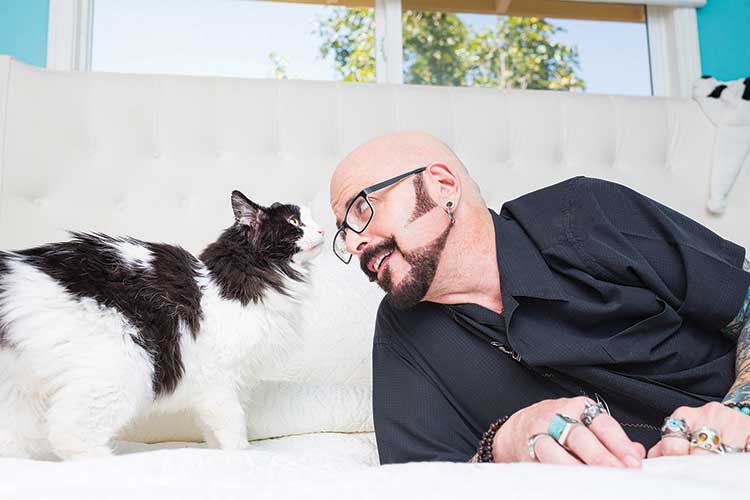On the hit Animal Planet series, My Cat from Hell, Jackson Galaxy, armed with a guitar case full of toys, visits the homes of people who have reached their wit’s end with incorrigible, sometimes even vicious, felines. There’s always a reason for the bad behavior (usually something the humans are doing wrong). The transformations made by both cats and guardians after they interact with “Cat Daddy” Galaxy are nothing short of magical.
Galaxy discovered his gift with cats when he moved to Boulder, Colo., to become a musician. He “needed a day job” and, after working in animal shelters, he went into private practice as a cat consultant in 2002. In 2007, Galaxy moved to Los Angeles where he worked one-on-one with cats in their homes. He continues to work closely with animal shelters and rescue groups, teaching his “Cat Mojo” approach to behavior to volunteers, staff, and adopters.
The author of a number of best-selling books, Galaxy serves on the board of directors for Stray Cat Alliance and Fix Nation in Los Angeles, as well as the Board of Advisers for Neighborhood Cats in New York City. I chatted with Galaxy about the most common feline issues, the benefits of having a “catio,” and his work with feral colonies. The interview has been edited for length and clarity.
What are most common cat issues?
Litter box problems and aggression — with other cats, humans, dogs. Acting defensively, lashing out. That’s how cats act out — blood and guts, pee and poop. That’s the criteria for my job. My watermark is, do I leave the cats happier than when I found them? Most all of the time, the answer is yes. That may mean we have to talk about a different living arrangement, because the cats are truly unhappy where they are. A solid 80 percent of the time, though, it works out.
You basically invented the catio — a safe outdoor space for indoor cats. What are the benefits?
We have seven cats and three dogs. When it was raining, we couldn’t let the cats in and out of the catio. It was so crowded in the house, and we have a lot of “catified” spaces. But I popularized the catio, so of course I’m a huge fan. You’ll see these arguments on cat forums, declawing and indoor versus outdoors. I think declawing is recognized as a bad thing, but the outdoor cat debate rages on. The best thing I can do for indoor cats is come up with a solution. A catio is an enclosed space outdoors, which gives cats access to all the good things without putting them in danger.
Perfect Fence is another solution — you can fence in your whole yard. If you have coyotes, you can’t expect it to save the day, so you still have to keep an eye on them. Like all “catification” solutions, you can always catify. Some people get really creative and elaborate, but a catio can also simply be chicken wire and wood — it doesn’t have to be a big fancy thing.
Besides reducing overpopulation, which is at crisis levels, what are some other benefits of spaying and neutering your cats?
Not spaying triples the chances of ovarian cancer in females; if you don’t neuter males they will fight and get diseases, roam, get hit by cars, and they will bust out of your house. They’ll be marking and fighting, so there’s nothing more important than spaying and neutering. It’s all of our responsibility to spay and neuter, to expand that circle of compassion. If you love the cat in your lap, you should love the cat under your car and their whole colony — care for them by becoming a community cat feeder, or support the groups that do. Adopt, don’t go to breeders, but only after you cross the fence that says, I love them all and not just mine. I’ve been in animal welfare for 25 years and we are in such a better place than we were when I started. It’s an encouraging time.
You promote helping feral cats with The Jackson Galaxy Project, and “trap, neuter, release,” or TNR, has been featured on My Cat from Hell — how can people find out more about volunteering in their communities?
Finding groups that do TNR is easy — go to your local shelter, search “feral” or “community cats” on social media, or put “SF feral cats” in your search engine. Alley Cat Allies (alleycat.org) has the Feral Friends Network. There is a growing community advocating for community colonies. Educate yourself. It’s a misconception that people don’t like ferals or that they see them as pests. I think inherently people are compassionate.
Email: susan@marinatimes.com
